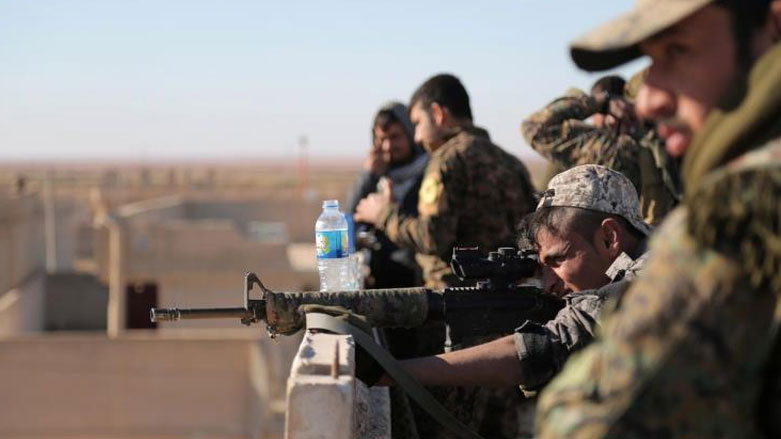SDF official says ISIS caliphate over but fight will continue

ERBIL (Kurdistan 24) – Mustafa Bali, head of the Syrian Democratic Forces (SDF) media center, says although the Islamic State’s caliphate has ended, it does not mean the group has been military defeated.
The SDF launched its final operation on the last village under the extremist group’s control called Baghuz on Saturday.
The Kurdish-led forces are expected to announce the final liberation of the last Islamic State-pocket in Syria soon. However, heavy fighting continues.
“Since yesterday evening, our forces have destroyed and captured 41 Islamic State targets. And this morning, the Islamic State gangs launched a counterattack,” Bali told Kurdistan 24 on Sunday.
“They used a car bomb. The attack was repelled. The operation goes on, but right now, our forces are busy with securing civilians’ safety,” he added.
#SDF have advanced on northern and western axis into Baghuz since 19:00 yesterday evening, capturing 41 positions of ISIS and destroying fortifications. IS counterattack was foiled at 4 am this morning. Heavy fighting is going on inside the last village at the moment.
— Mustafa Bali (@mustefabali) February 10, 2019
So far, the SDF has saved thousands of civilians, who are most likely relatives of Islamic State fighters.
“In the past two weeks, we managed to get over 20,000 civilians out of harm’s way through a safety corridor,” Bali said. “They have now been transferred to safe zones.”
#Lezgîn #Breaking
— Hoshang Hasan (@HosengHesen) February 10, 2019
SDF fighters liberated 2KM square after started a last operation against #ISIS in #DeirEzzor
Şervanên #QSD 2KM çarkoşe rizgar kirin, piştî ku doh dest bi oprasyona dawî li #DêraZorê li dijî #DAIŞ kirin pic.twitter.com/8fnGNSH8Zu
#Breaking #Lezgîn
— Hoshang Hasan (@HosengHesen) February 10, 2019
More than one thousand civillian arrived to #SDF area from AlBaghoz village
Zêdetirî 1 hezar sivîlî ji gundê ElBaxoz gihan herêmên #QSD'ê#TwitterKurds #Syria pic.twitter.com/Lv2jsaxOKX
On Friday, UK Maj. Gen. Christopher Ghika, deputy commander-strategy and information for the US-led coalition, said Islamic State fighters “are attempting to escape through intermixing with the innocent women and children attempting to flee the fighting.”
However, he said these tactics would not succeed, since the SDF is focused on finding Islamic State fighters in hiding, while Iraqi forces have secured the border to ensure the extremists cannot enter Iraq.
According to Bali, there are onlyaround 1,000 civilians left in Baghuz. “They are mostly ISIS gangs’ families. But they are civilians nonetheless.”
Therefore, he said, the SDF is taking more measures to create a corridor to make sure they remain safe.
However, Bali warned that the Islamic State is still quite strong as a “political paradigm, an ideology, and organization.”
“It will require a much longer time to tackle,” he underlined.
“We, as the SDF, think that dealing with and finishing off the Islamic State militarily was the easy step, but now comes the more challenging phase.”
The SDF official also said high-level Islamic State commanders had not been captured yet. Until now, the extremist group’s leader, Abu Bakr al-Baghdadi, is still in hiding.
“During the battle of Hajin, the Islamic State command was out of Hajin directing the war from elsewhere. The fact that we didn’t capture any high-ranking ISIS members means they were elsewhere,” Bali noted.
“In conclusion, we are at the onset of a longer fight against ISIS which will require deep coordination, unity, and preparedness.”
Abdul Hamid al-Muhabash, the co-chair of the Democratic Autonomous Administration (DAA) in northeastern Syria, also expressed similar opinions as the SDF official.
He told Kurdistan 24 in a recent interview that the Islamic State’s caliphate might have “vanished, but ISIS as an ideology and mentality in Deir al-Zor, Raqqa, and, Manbij will stay.”
Muhabash argued the next phase against the Islamic State would come in the shape of sleeper cells and underground networks. Therefore, the US-led coalition should provide “intelligence in order to remove sleeper cells and dismantle the threat of the terrorist organization.”
The official also warned that the Islamic State would benefit from any US withdrawal of over 2,000 troops from Syria.
The Pentagon’s Inspector General published a report last week that warned if American troops leave Syria, the Islamic State would “likely resurge in Syria within six to 12 months and regain limited territory.”
However, Muhabash said the SDF do not only depend on the US, but also other coalition forces that have not announced yet that they would withdraw.
“Moreover, we have the SDF and local security forces that can achieve final security in the region,” he concluded.
Editing by Karzan Sulaivany
(Ekrem Salih and Rawa Barwari contributed to this report)
